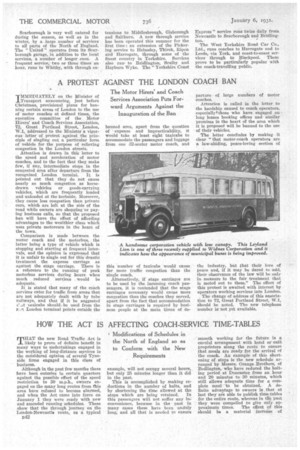A PROTEST AGAINST THE LONDON COACH BAN
Page 56

If you've noticed an error in this article please click here to report it so we can fix it.
The Motor Hirers' and Coach Services Association Puts Forward Arguments Against the Inauguration of the Ban I'IMMEDIATELY on the Minister of Transport announcing, just before Christmas, provisional plans for banning certain areas of London to the use of motor coaches at defined times, the executive committee of the Motor Hirers' and Coach Services Association, 72, Great Portland Street, London, W.1, addressed to the Minister a vigorous letter of protest against the principle of singling out a particular form of vehicle for the purpose of relieving congestion in the London streets.
Attention is drawn in thiS letter to the speed and acceleration of motor coaches, and to the fact that they make few, if any, intermediate stops in the congested area after departure from the recognized London termini. It is pointed out that they do not cause nearly so much congestion as horsedrawn vehicles or goods-carrying vehicles, which are frequently loaded and unloaded at the kerbside. Moreover, they cause less congestion than private cars, which are left at the side ef the road while owners are shopping or paying business calls, so that the proposed ban will have the effect of affording advantages to the wealthier class which uses private motorcars in the heart of the town.
Comparison is made between the motor coach and the motorbus, the latter being a type of vehicle which is stopping and starting at frequent intervals, and the opinion is expressed that it is unfair to single out for this drastic treatment the express carriage as against the stage carriage. There is a reference to the running of peak motorbus services during hours when much reduced services would be adequate.
It is stated that many of the conch services cater for traffic from areas that are not adequately dealt with by tube railways, and that if it be suggested taxicabs should be used from the xl,e, London terminal points outside the banned area, apart from the question of expense and impracticability, it would take at least eight taxicabs to accommodate the passengers and luggage from one 32-seater motor coach, and this number of taxicabs would cause far more traffic congestion than the single coach.
Alternatively, if stage carriages are to be used by the incoming coach passengers, it is contended that the stage carriages necessary would cause more congestion than the coaches they served, apart from the fact that accommodation in stage carriages is required by business people at the main times of de parture of large numbers of motor coaches.
Attention is called in the letter to the hardship caused to coach operators, especially W those who have engaged on 'S long leases booking offices and similar premises in the heart of the area which it is proposed will be banned to the use of their vehicles.
The letter concludes by making it clear "that motor-coach operators are a law-abiding, peace-loving section of the industry, but that their love of peace and, if it may be dared to add, their observance of the law will be only in measure to the fair treatment that is meted out to them." The effect of this protest is awaited with interest by operators working services into London. , The change of address of this association to 72, Great Portland Street, W.1, should be noted. The new telephone number is not yet available.




























































































